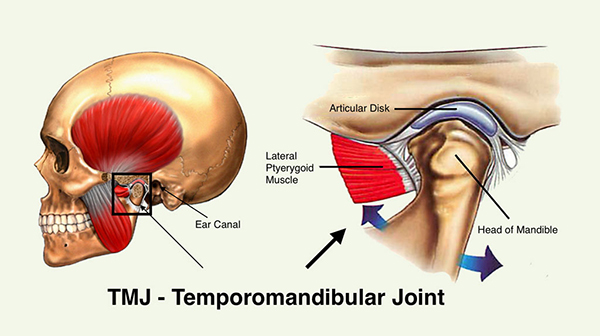Do you have ear pain?
Ear pain, stuffy ears, tinnitus, neck pain can all be symptoms of a TMJ disorder from a full CPAP mask.
CPAP is the primary treatment offered for Obstructive Sleep Apnea and snoring. Surgical approaches are available with differing success rates and risks.
Oral Appliance therapy for sleep apnea is gaining popularity for it’s convenient use and longitudinal studies show better health outcomes for patients who use Oral Appliances all night, every night compared to the standard 4+ hours of CPAP use in an 8 hour sleep period.
A full CPAP mask puts posterior force on the chin and lower jaw in order to maintain a seal so that the CPAP actually works. The TMJ, or “jaw joint” is part of the lower jaw, in front of each ear.

Upward and backward pressure on the jaw also pushes the TMJ into the front of the ear, and can cause pain, tinnitus, stuffiness.
With prolonged pressure on the chin, the jaw bone is pressed back towards the ear. Over a few months or years, this causes damage to the cartilage disc, often noted as a clicking when the jaw is moved or a decrease in mouth opening. The TMJ is just in front of the ear.
Pressure from a dislocated TMJ disc on the front of the ear can trigger inflammation and pain, tension in the ear drum or eustachian tube. Both conditions can cause ear pain, stuffiness, or muffled hearing.
If you notice increasing discomfort in the ears or jaw joint or, if you begin clenching or grinding your teeth and wear full mask CPAP, it’s possible that your TMJ has been damaged. You should have it evaluated by a dentist trained in TMJ therapy and corrected early for a better likelihood of success.
Treatment of a TMJ problem usually involves oral orthotic appliances to restore mobility in the TMJ, decrease pressure on the ear, and allow your CPAP mask to maintain a consistent seal throughout the night.
Co-therapy for Sleep Apnea using Oral Appliances is gaining popularity for many patients. Using CPAP as much as possible and using an Oral Appliance any time CPAP is not used throughout the sleep period. Increasingly, patients are choosing to use OAT (oral Appliance Therapy) for business travel, vacations, camping, and any night they aren’t able to wear their CPAP because of it’s ease of use, effectiveness even in severe apnea, and lack of noise for sleep partners.
TMJ Sleep Solutions is dedicated to treating TMJ disorders and Sleep apnea. It’s conveniently located to help people from Ft. Collins, Loveland, Boulder, Denver and the surrounding area.



